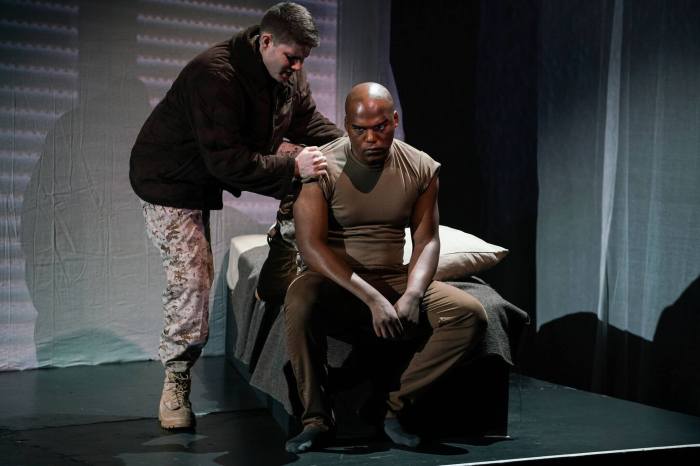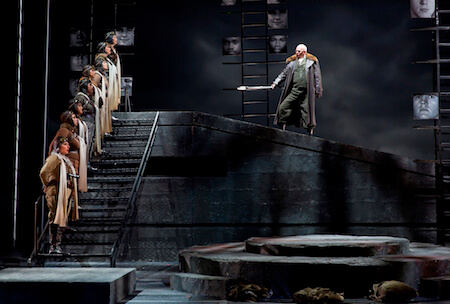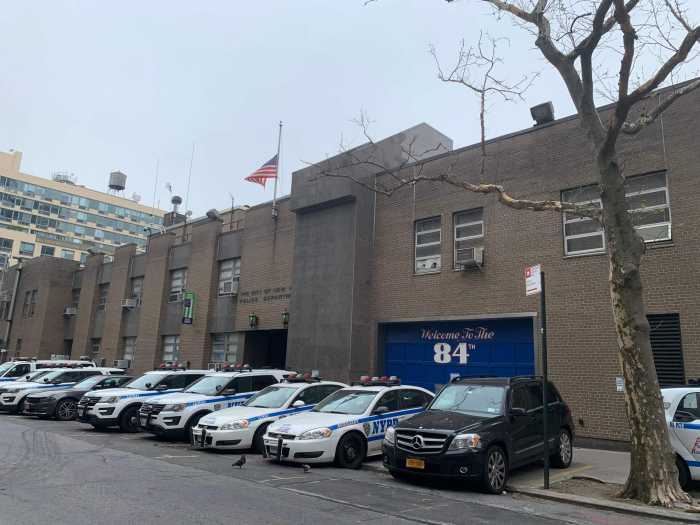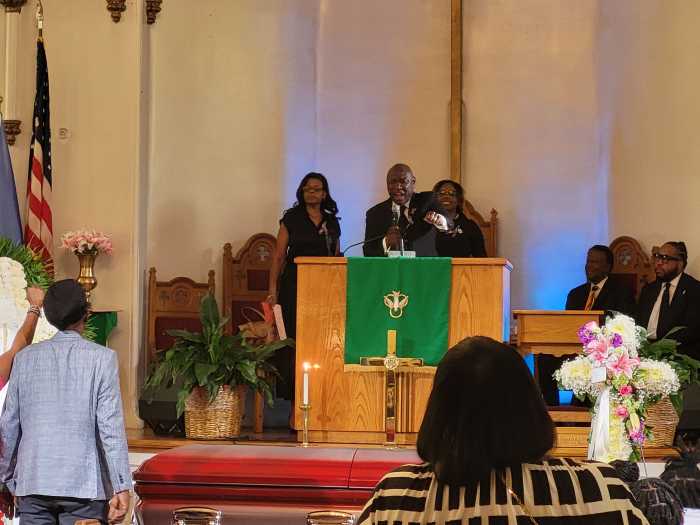Kristine Opolais in the title role of DvoÅ™ák’s “Rusalka.” | KEN HOWARD/ METROPOLITAN OPERA
The Met needed a new “Rusalka” to replace Otto Schenk’s antique Vienna-sourced fairy-tale version, which witnessed some extraordinary performances starring Gabriela Benacková and Renee Fleming. Given Mary Zimmerman’s catastrophic history at this theater, what she and her fine design team produced, seen February 2, proved quite creditable and enjoyable — if short on insight or revelations. The actual plot-central lake was kept to Daniel Ostling’s lovely forecurtain; the playing space, hemmed by false perspective walls suggesting Watteau, had what looked like a Jacuzzi in the outer acts and multiple ice bowls in Act II’s Palace (in one corner of which were all the stag antlers left over from Mariusz Trelinski’s “Iolanta” staging). Mara Blumenfeld’s beautiful costumes evoked the 18th century, though the Foreign Princess got a Turandot headdress.
In the pit, Mark Elder generated general sonority, but often seemed to seek symphonic rather than dramatic tempi. The initial prelude emerged quite inert, setting a pattern to which he far too frequently returned. The second act finale did achieve some tension — this despite the uncomfortable spectacle of hearing yet another respect-worthy though aging dramatic soprano (Katarina Dalayman) damage her reputation on the shards of the Foreign Princess’s unforgivingly written part. Only Eva Urbanová (2004) and Christine Goerke (2009) have served this part well here.
Kristine Opolais looked lovely and acted with passion and fearless physical commitment; she knows the part well and was always vocally adequate, though hard-pressed at strenuous moments. One simply wishes that her instrument — basically a competent “house soprano” — offered more plushness and tonal reserves. Past some initial tightness on top, Brandon Jovanovich sang and acted a very credible Prince, impressively singing even as he carried Rusalka in his arms. Eric Owens, notably healthier of voice than recently, made a moving Vodnik — like Jovanovich offering fine dynamic shading. As a gruesomely witty Jezibaba, Jamie Barton’s sensational dark mezzo showed much Wagnerian promise.
“Rusalka,” “Carmen” please at the Met; worthy evenings at Carnegie, in Philly
Three excellent debutants in smaller roles: Hyesang Park, a lovely light soprano for the First Wood Nymph; Anthony Clark Evans, an even, resonant baritone for the offstage Hunter; and, especially the full-toned, tangy mezzo of Daniela Mack (Kitchen Boy), who has already sung leading Handel, Mozart, and Rossini roles in major American and British theaters. Opposite Mack as the comic Gamekeeper we heard the impressively well-oiled baritone of Alan Opie, aged 71. Like all Met shows, it’ll look and sound better on HD in theaters February 25. On balance, it was well worth experiencing this ravishing music.
The next night, the theater housed a very enjoyable repertory performance of “Carmen.” Richard Eyre’s production remains unprepossessing, but revival director Jonathon Loy had cut some of the worst business (like Carmen abusing Micaela in Act Three) and the cast worked in synch. The big news was Clémentine Margaine: an actual Frenchwoman in the iconic role, likeable and attractive, with sensuous voice and presence. She phrased creatively, though sometime taking an unduly Streisandesque approach to moving the voice. Margaine gave the part rare credibility; she and her pleasant-sounding sidekicks (Danielle Talamantes, Shirin Eskandani) even took part in the dancing with zero embarrassment. Rafael Davila — replacing Marcelo Alvarez, as he had at the premiere — gave a strong shot at José, modulating his volume if getting somewhat raw at top forte. Offering her first Micaela was Janai Brugger, a young soprano with a beautiful, individual billowing tone who acted well and wanted only a bit more legato smoothness in shaping lines. In voice and bearing, Kyle Ketelsen energetically reaffirmed his status as one of the world’s only current satisfying Escamillos. Nicolas Testé (Zuniga) channeled francophone style, but the best–sung small part was John Moore’s elegant Morales. Asher Fisch, occasionally rushing, led a taut reading; the Children’s Chorus sang and acted very well indeed.
Met to world: “Habemus Carmen!”
Philadelphia’s superb Chamber Music Society derives from Vermont’s remarkable Marlboro Festival, a classical musical feast now starting its seventh decade. So one regular feature of PCMS’ offerings are concerts by young musicians playing pieces honed at the previous summer’s festival. January 26 at the Perelman Theater — blessed with excellent acoustics and sightlines — the versatile pianist Lydia Brown and a fine string quartet (violinists Michelle Ross and Carmit Zori, violist Rebecca Albers, and cellist Alice Yoo) were joined in a program with tenor Nicholas Phan as guest artist. With his usual compelling artistry and interpretive charm, he offered five selections from Beethoven’s 1810-13 “Irish Songs” and Vaughan Williams’ 1909 death-haunted, A.E. Housman-texted “On Wenlock Edge.” “Bredon Hill,” the Williams cycle’s penultimate song, proved a particular highlight. In the last few years, Phan’s lower range has expanded in impact and color, which somewhat offsets the sense of judder that now can mark his forte high range under pressure. Few active singers parse verse with such keen intelligence. In the well-served other pieces, Haydn’s Opus 76 #5 and Beethoven’s third Razumovsky quartet, Yoo’s forthright, sonorous playing proved especially heartening.
As part of an impressive mini-festival built around the music of Venice, Carnegie Hall presented a strikingly vibrant reading of “Juditha Triumphans” (February 7), the sole oratorio by Antonio Vivaldi of the known four to survive (albeit without its overture). Those somewhat bored by Vivaldi’s pretty but rather routine operatic music are often astonished by this work’s inventive instrumentation and dramatic focus. Andrea Marcon’s 10-year-old Venice Baroque Orchestra proved as enjoyable as on its many recordings; the playing in ensemble and by solo obbligato instruments was consistently outstanding.
This version of the Judith and Holofernes story, written for the all-female cast at Vivaldi’s disposal, offers a wide expressive and dynamic range of da capo arias. Some of the stylish vocalists (particularly Mary-Ellen Nesi as Holofernes) would have fared better in a smaller room, but that would have meant fewer listeners. Nesi — very musical — never forced beyond her means. Delphine Galou, a rather lyrical contralto, made an admirably poised warrior heroine, with a nice play of dynamics compensating for limited tone color. German mezzo Silke Gaeng channeled fresh tone as Judith’s handmaiden.
Francesca Ascioti, in the two-aria role of the local general (the city of Betulia stands in for Venice here in struggles against Middle Eastern powers), showed an arresting contralto and sharply uttered words, but she aspirated her coloratura. That stood out given the presence — rare on this continent — of the great Swedish mezzo Ann Hallenberg, one of the world’s leading classical recording artists, as far as quality is concerned. Her pellucid tone and incredibly fluid singing won several ovations.
David Shengold (shengold@yahoo.com) writes about opera for many venues.



































